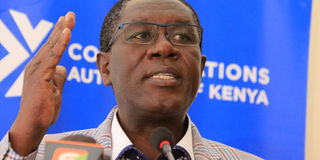Interesting directive to media owners on political coverage

Communications Authority of Kenya Director-General Francis Wangusi addresses the media on February 17, 2017 at Intercontinental Hotel, concerning the Device Management System. The agency has issued a directive pertaining media owners who want to venture into politics. PHOTO | JEFF ANGOTE | NATION MEDIA GROUP
What you need to know:
- The editors and reporters suffer no illusions that they are employed to practise professional and independent journalism.
- It was legally impossible to expel from newsrooms media practitioners, or owners, who venture into politics.
A news item one week ago might have escaped the attention of most people outside the media fraternity, yet it touched on a topic of great national importance, particularly in an election year.
The Director-General of the Communications Authority of Kenya, Mr Francis Wangusi, declared that media owners who will be candidates in the General Election slated for August must “delink” themselves from their companies so that they do not influence political coverage.
At first glance that might seem like a common-sense edict.
Eyebrows have already been raised that some journalists who are making the switch to politics have been allowed to continue reporting and editing at various newspapers and radio and television stations.
It is obvious that restrictions that apply to journalists who might misuse their positions in the newsroom, should also be extended to media owners.
However, edicts such as the one issued by Mr Wangusi remain mere roadside pronouncements unless they are based on clear laws and regulations.
The CA claims some contested function as a media content regulator, but it was notable that the director was extremely vague on the legal provision he could use to enforce his directive.
He was also fuzzy on what exactly he meant by the term “delink”.
Does it mean relinquishing ownership? Or maybe resigning from the board of directors or management?
SET UP LAW
President Uhuru Kenyatta does not have to sit in the Kameme FM newsroom to direct an editorial policy dedicated to building up his political profile and demonising his rivals.
He does not sit on the board of directors or hold a management position in the holding company of the fast-growing media conglomerate, but would still qualify for membership of the Media Owners Association.
Other politicians who own or control media companies, including opposition leader Raila Odinga and former President Daniel arap Moi, have similarly kept arms-length relationships with their outfits.
However, their employees are well briefed on what they must do.
The editors and reporters suffer no illusions that they are employed to practise professional and independent journalism.
Indeed, the official industry regulator, the Media Council of Kenya, found itself in legal limbo when it tried to force out of newsrooms journalists who were already campaigning for elective positions.
There was no law it could apply, and, therefore, it was limited to appealing to the employers to do the right thing.
We expect to see today the official launch of guidelines on election reporting, to which media houses and representative bodies are expected to subscribe.
(Disclosure: I was involved in drafting the guidelines drawn up under the ambit of the Media Council and various representative groups such as the Kenya Editors’ Guild, Kenya Union of Journalists, Association of Media Women in Kenya, and Kenya Correspondents Association).
We found while writing the guidelines that it was legally impossible to expel from newsrooms media practitioners, or owners, who venture into politics.
The document contains extensive guidelines on fair and balanced reporting, avoiding partisanship, and the usual red flags on hate speech, ethnic baiting, and war-mongering; but they could only be drafted in conformity with existing constitutional guarantees on freedom of media, freedom of expression, freedom to propagate ideas, and even the right to private property.
GOVT'S ATTACK DOG
Enforcement, therefore, has to be within laws and regulations that Mr Wangusi will find he can’t get around.
Where the laws are not adequate, however, a lot can depend on moral persuasion.
A respected, neutral arbiter can be vital, but unfortunately the CA does not fit the bill.
It has at the instigation of the government usurped media regulatory functions that should be under an independent body, not an outfit whose board is dominated by establishment hirelings.
It sometimes seems intent on rivalling disgraced institutions such as the NGO Coordination Board and the Ethics and Anti-Corruption Commission, whose bosses act only as messengers of the ruling establishment.
We have seen a series of outrageous actions by the boss of the NGO regulatory body, Mr Fazul Mahamad, clearly targeting institutions associated with leading opposition figures.
A fellow who holds public office only because he serves the government’s phobia for civil society, media and other independent institutions will obviously sing his master’s voice.
God save the Kenya from similar overzealous approaches by the Communications Authority.
Email: [email protected] Twitter: @Macharia Gaitho





